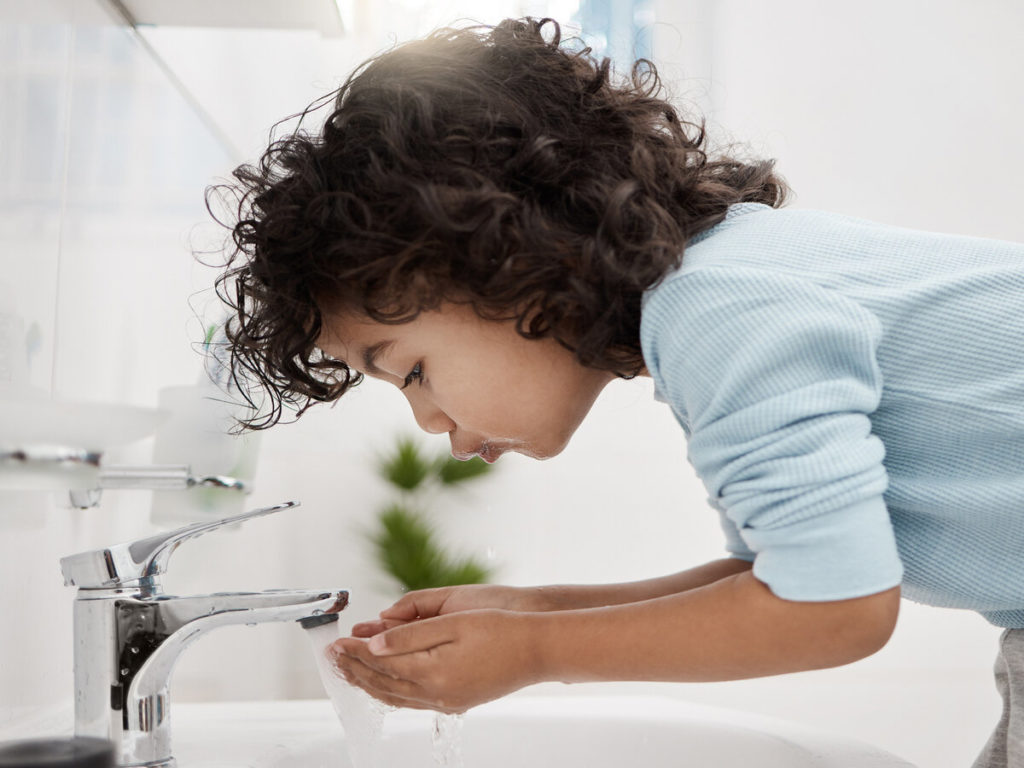The water from your kitchen faucet looks clear. It smells pretty normal. Is that H2O good to go? Keep reading to learn all about drinking from the tap, as well as how to increase healthy outcomes for your family by using a water filtration system.
Is Faucet Water Safe to Drink?
Let’s just cut to the chase: can you drink faucet water, or are you better off buying bottled options instead? The short answer is yes.
Most parts of North America offer safe drinking water through their public water systems. Tap water in these areas have often been properly filtered — unlike what you might find in other nations around the world.
However, there could still be trace amounts of bacteria and microbes within the water supply. According to the Environmental Protection Agency (EPA), common sources of drinking water contaminants include agricultural runoff, byproducts from water treatment, and even human waste from sewage and septic systems. (Yuck!)
If your drinking water supply contains unsafe levels of these contaminants, it can have serious health effects. You may experience gastrointestinal illnesses, disruptions to your nervous system, or for pregnant women, potential complications. While major health risks are rare, it’s important to be aware, so you can take further precautions when possible.
How to Keep Drinking Water Clean at Home
Even though treated tap water is generally safe to drink — especially since most lead pipes have been discarded at this point — it’s possible to make your water supply more reliable. The best way to improve your water quality is with the help of traditional water filters or a water filtration system.
Use a Reverse Osmosis Filtration System or Activated Carbon Filters
These days, there are two main types of filtration systems for residential use: reverse osmosis and activated carbon filters. Both systems can remove contaminants and improve the quality of your water, though the type of contaminants they remove differs.
In addition to removing viruses and bacteria, reverse osmosis filtration can help with salts, nitrates, and heavy metals (copper, iron, etc). By contrast, activated carbon filters are more effective at removing pesticides, industrial solvents, and disinfectants used in water treatment (chlorine, bromine, etc).
Use an Ultraviolet Filtration System
There’s also the option to use an ultraviolet filtration system. This category harnesses the power of UV light to produce purified water for your entire home. Though UV products can get expensive, they disinfect without adding or taking anything away from your water — making them an environmentally-friendly way to remove 99.9% of harmful microorganisms.
Boil Your Water
What’s more, if you’re in a bind or you don’t have a trusted water source, you can always boil your tap water to ensure it’s safe to drink. Boiling water is among the safest way to kill disease-causing viruses and bacteria, though you’ll want to add a pinch of salt for each quart (or liter) of water you boil.
How Much Water Should You be Drinking Every Day?
The most common recommendation for daily water intake is about eight 8-ounce glasses each day. This equals to about two liters, or half a gallon of water. Keeping up with your recommended water intake can have numerous health benefits — from protecting your organs and tissues to aiding in digestion and regulating body temperature.
If you have children who could stand to drink more water, try infusing flavor into their water by adding lemons, cucumbers, or berries. You might also freeze ice cubes with berries and pop them into your kiddo’s drinking glasses. If your children aren’t old enough to use glassware, buy them their own special water cup or miniature water bottle (4 or 8 ounces). They’ll be a lot easier to hold.
Get Safe Drinking Water with Help from Rent-A-Center
Does your tap water have *creepy* things hiding in it? If your H2O has you thinking “OH NO,” then why not try a water filtration system from Rent-A-Center? There’s no need to make a big payment up front, so you could be drinking cleaner water by tonight! Shop for water filtration systems online or at a local Rent-A-Center location near you.

